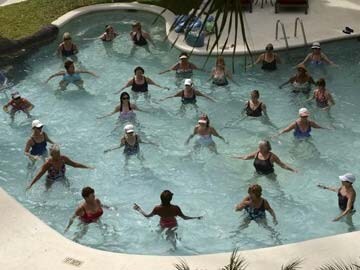
People take part in an aqua aerobics session in a swimming pool at a resort at Holetown, Barbados March 7, 2014.
Reuters
New York:
While older, overweight or injured exercisers have always valued the cushioning effects of water workouts, a new wave of trendy, lively and high intensity group fitness classes is luring the young, the hip and the able-bodied into the pool.
Aqua Zumba, boot camp, and synchronized swimming are among the classes experts say put every muscle through a range of motion even the fittest can't approach on dry land.
Lori Rose Benson of the YMCA of Greater New York said seniors populate daytime pool classes, but the evening attracts a younger, party-oriented crowd.
Synchronized swimming, a class of elaborate strokes and stunts set to music, has become a favorite among Brooklyn hipsters, she said. Aqua Zumba, also called "pool party," is popular with the younger crowd throughout the city.
"Really, it depends on the time of day," Benson said. "Aquatic exercise can have all the benefits of a really tough cardiovascular workout. It's what you put into it."
Three times a week at an Equinox fitness center in New York City, swim coach Ellis Peters leads Aqua Boot Camp, an hour-long interval workout he said takes aim at every major muscle group.
"I try to use every inch of the 25-yard (23-meter) pool," Peters said of the class, which employs flotation devices in a fast-changing sequence of running, jumping jacks and core exercises.
"We usually don't do any one thing more than a minute," said Peters.
Moving through water is powerful, he added, because the resistance, or drag coefficient, is 12 times what it is in air and works on the body in all directions.
"I can't imagine a machine on land that would be able to duplicate the omni-dimensional resistance of the water," he said. "It doesn't exist."
Rhode Island-based Karen Kent said she plunged into pool workouts after asthma began to hamper her running style.
"I couldn't run much in my 20s," said Kent, an aquatic expert who wrote the water exercise chapter for the American College of Sports Medicine's group fitness handbook.
She said even the most able-bodied like turning to water to relieve pressure and extend their range of motion.
"Even really strong athletes want to come to water to stretch muscles back out," she said. "Water offers another piece of fitness you can't get on the ground."
The level of exertion feels less in the water, she added, so the right instructor can really ramp it up with deep water running and jogging intervals.
Kent said the pool temperature for water workouts should be around 83 to 85 degrees Fahrenheit (28 to 29 Celsius), with air temperature about two degrees higher. That's because unlike swimmers, who are comfortable in the high 70s (mid 20s), the exercisers' heads are above the water line.
"Swimming laps is different from doing exercise," she said. "Every workout has something else to offer and a well-rounded athlete should do all of it."
Aqua Zumba, boot camp, and synchronized swimming are among the classes experts say put every muscle through a range of motion even the fittest can't approach on dry land.
Lori Rose Benson of the YMCA of Greater New York said seniors populate daytime pool classes, but the evening attracts a younger, party-oriented crowd.
Synchronized swimming, a class of elaborate strokes and stunts set to music, has become a favorite among Brooklyn hipsters, she said. Aqua Zumba, also called "pool party," is popular with the younger crowd throughout the city.
"Really, it depends on the time of day," Benson said. "Aquatic exercise can have all the benefits of a really tough cardiovascular workout. It's what you put into it."
Three times a week at an Equinox fitness center in New York City, swim coach Ellis Peters leads Aqua Boot Camp, an hour-long interval workout he said takes aim at every major muscle group.
"I try to use every inch of the 25-yard (23-meter) pool," Peters said of the class, which employs flotation devices in a fast-changing sequence of running, jumping jacks and core exercises.
"We usually don't do any one thing more than a minute," said Peters.
Moving through water is powerful, he added, because the resistance, or drag coefficient, is 12 times what it is in air and works on the body in all directions.
"I can't imagine a machine on land that would be able to duplicate the omni-dimensional resistance of the water," he said. "It doesn't exist."
Rhode Island-based Karen Kent said she plunged into pool workouts after asthma began to hamper her running style.
"I couldn't run much in my 20s," said Kent, an aquatic expert who wrote the water exercise chapter for the American College of Sports Medicine's group fitness handbook.
She said even the most able-bodied like turning to water to relieve pressure and extend their range of motion.
"Even really strong athletes want to come to water to stretch muscles back out," she said. "Water offers another piece of fitness you can't get on the ground."
The level of exertion feels less in the water, she added, so the right instructor can really ramp it up with deep water running and jogging intervals.
Kent said the pool temperature for water workouts should be around 83 to 85 degrees Fahrenheit (28 to 29 Celsius), with air temperature about two degrees higher. That's because unlike swimmers, who are comfortable in the high 70s (mid 20s), the exercisers' heads are above the water line.
"Swimming laps is different from doing exercise," she said. "Every workout has something else to offer and a well-rounded athlete should do all of it."
© Thomson Reuters 2014
Track Latest News Live on NDTV.com and get news updates from India and around the world

